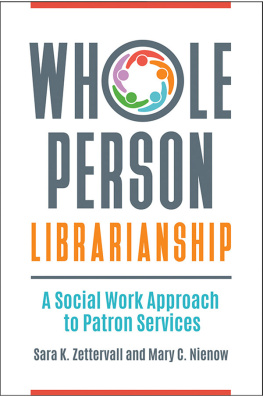Columbia University Press
Publishers Since 1893
New York Chichester, West Sussex
cup.columbia.edu
Copyright 2007 Columbia University Press
All rights reserved
E-ISBN 978-0-231-50854-4
Library of Congress Cataloging-in-Publication Data
Vonk, M. Elizabeth
Research techniques for clinical social workers /
M. Elizabeth Vonk, Tony Tripodi, Irwin Epstein.2nd ed..
p. cm.
Includes bibliographical references and index.
ISBN 023113388X (cloth : alk. paper)ISBN 0231133898 (pbk. : alk. paper)
ISBN 0231508549 (pbk. : alk. paper)
1. Social serviceResearch. I. Tripodi, Tony. II. Epstein, Irwin. III. Title.
HV11.T747 2006
361.3072dc22
2006017789
A Columbia University Press E-book.
CUP would be pleased to hear about your reading experience with this e-book at .
The purpose of this book is to provide an introduction to the use of research concepts and techniques for collecting, analyzing, and interpreting information relevant to clinical social work practice. By this last term we refer to the efforts of social workers to help individuals, families, and groups of clients to resolve their psychosocial problems. These efforts may involve changing the clients, changing others in the clients environment, or both. They take place in a range of organizational settings and are rooted in a variety of theoretical perspectives.
The book is written for social work students and practitioners who are not research trained. It presents selected research concepts and techniques that can be applied by clinical social workers irrespective of their theoretical orientations or practice settings. Accordingly, examples will be provided throughout the book that incorporate various practice theories and programmatic locations. Neither the research concepts and techniques nor the practice theories and settings are exhaustive. They simply represent a beginning attempt to incorporate research into clinical social work practice.
Our basic assumption in writing this book is that the use of research concepts and techniques can facilitate the rational use of information by social workers engaged in direct practice with individuals, families, or groups. Our emphasis, however, is on the collection and use of information concerning individual clients and significant others in their lives. Consequently, we primarily employ concepts that treat the individual as the basic unit of analysis. And while we do not utilize concepts that focus on the family or group per se, such as family power structure or group cohesiveness, we do indicate how clients involved in family therapy or group treatment can be clinically assessed as individuals. Moreover, we suggest ways in which individual data can be aggregated or combined to make inferences about families and groups.
PRACTICE AND RESEARCH
Although research courses are required in any social work curriculum, clinically oriented social work students often tend to view these courses as irrelevant to practice. Sometimes they are. As a result, many practicing social workers who have merely done their time in required research courses fail to see how research can aid them in their work. When they do recognize its potential utility, often they do not know how to integrate research into practice.
Despite their lack of applied research training and competence, practicing social workers are under increasing pressure from funding sources, client groups, and agency administrators for more objective information describing their efforts and their effectiveness. Among the many forces moving social work practice toward objective evaluation is the delivery of health and mental health services through managed care systems. Managed care controls and distributes health care by a variety of mechanisms, including utilization review processes that require providers such as social workers to present evidence of the necessity and potential effectiveness of proposed interventions. Moreover, for quality assurance reviews, providers are asked to show that clients have achieved specified outcomes through their interventions.
In addition, most practitioners undoubtedly are aware of the increasing interest in evidence-based-practice (EBP) within social work and other helping professions, including medicine and psychology. EBP involves a process of systematically searching and evaluating current research related to a particular clinical problem in order to inform and guide practice with the best evidence available. Interest in EBP, related to both the empirical practice movement and the demand for accountability, is reflective of a desire on the part of many social work researchers to develop a systematic, research-validated knowledge base for practice.
Still other developments in social work practice and research have affected the need for clinical social work practitioners to develop or sharpen research skills. As the population of the United States becomes increasingly diverse, social workers are challenged to meet the needs of clients of many and varied ethnicities. While some practice and research guidelines have emerged for cross-cultural practice, empirical support of treatment effectiveness has only rarely been studied among ethnic minorities. Practitioners who offer assessments and interventions to ethnic minority clients must rely on a variety of research techniques to obtain feedback from clients regarding both cultural relevance and effectiveness of services.
Fueled in part by increased diversity and the need for cultural competence in practice, another research trend in social work has been the increased use of qualitative research methods. Qualitative methodology is flexible, subjective, and results in a descriptive narrative of a particular phenomenon. Techniques and concepts of this methodology have been useful to practitioners in a variety of areas, including assessing service needs within communities, monitoring interventions, and evaluating consumers perceptions about an agency or the service it provides.
Social work research and practice have also been deeply affected by the growth of information technology (IT). From electronic record keeping to computer-based administration and scoring of evaluation instruments, social workers are increasingly in need of computer skills and Internet capability. With such skills and capability, social workers can make use of IT to integrate research and practice in many ways, including computer-based assessments, management of clients evaluation data, analysis of assessment and evaluation data, access to research literature related to treatment effectiveness, and participation in virtual communities of practitioners among whom knowledge may be shared.
Finally, the NASW Code of Ethics not only outlines guidelines for ethical conduct when engaged in research, it also requires practitioners to stay current with and base practice on relevant practice-related knowledge. Further, the code requires social workers to monitor and evaluate their practice interventions. In sum, the code makes it clear that research skills are mandatory for ethical social work practice. Social workers must possess research knowledge and skills that enable them to utilize existing research to inform practice as well as to engage in research in order to evaluate practice and build practice knowledge.

 New York
New York





